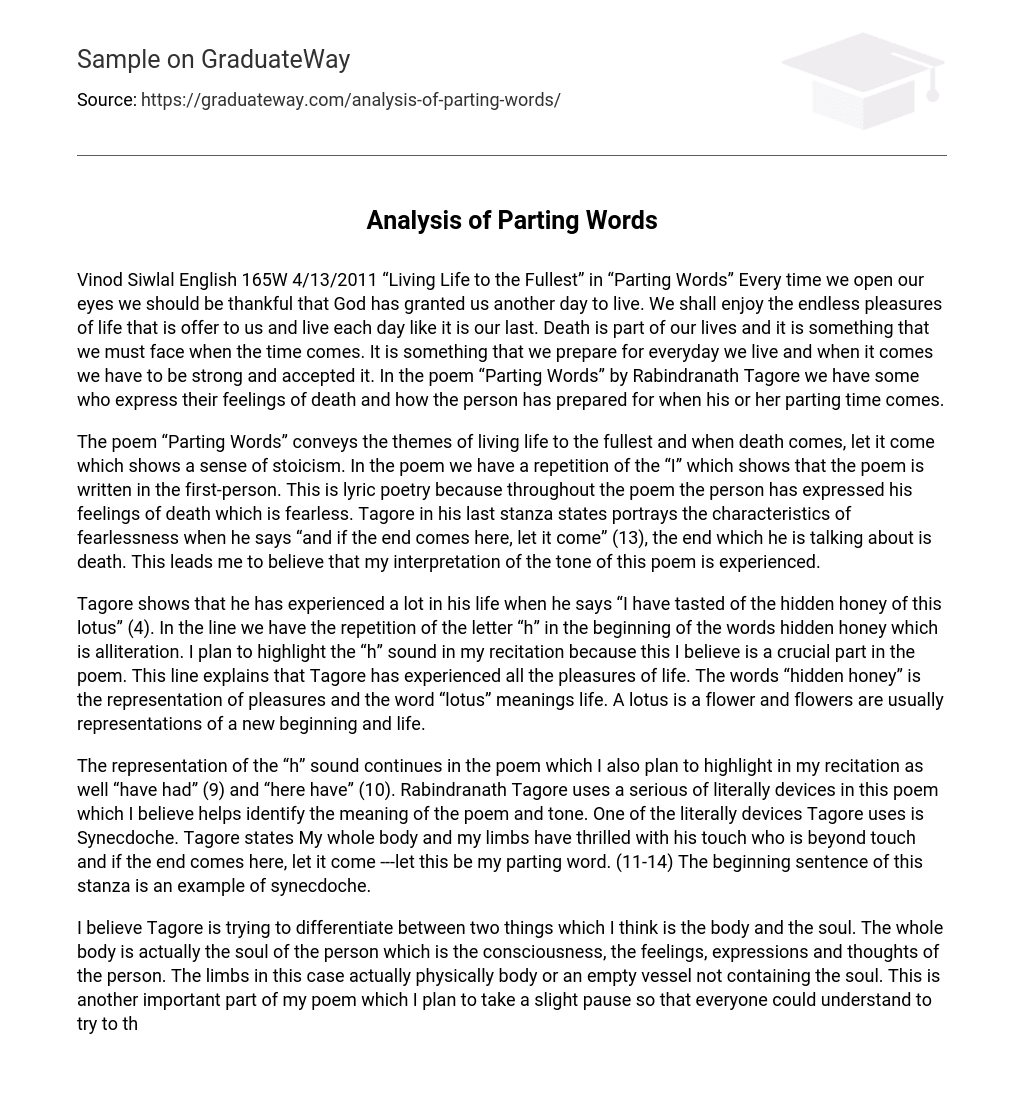Every time we open our eyes we should be thankful that God has granted us another day to live. We shall enjoy the endless pleasures of life that is offer to us and live each day like it is our last. Death is part of our lives and it is something that we must face when the time comes. It is something that we prepare for everyday we live and when it comes we have to be strong and accepted it. In the poem “Parting Words” by Rabindranath Tagore we have some who express their feelings of death and how the person has prepared for when his or her parting time comes.
The poem “Parting Words” conveys the themes of living life to the fullest and when death comes, let it come which shows a sense of stoicism. In the poem we have a repetition of the “I” which shows that the poem is written in the first-person. This is lyric poetry because throughout the poem the person has expressed his feelings of death which is fearless. Tagore in his last stanza states portrays the characteristics of fearlessness when he says “and if the end comes here, let it come” (13), the end which he is talking about is death. This leads me to believe that my interpretation of the tone of this poem is experienced.
Tagore shows that he has experienced a lot in his life when he says “I have tasted of the hidden honey of this lotus” (4). In the line we have the repetition of the letter “h” in the beginning of the words hidden honey which is alliteration. I plan to highlight the “h” sound in my recitation because this I believe is a crucial part in the poem. This line explains that Tagore has experienced all the pleasures of life. The words “hidden honey” is the representation of pleasures and the word “lotus” meanings life. A lotus is a flower and flowers are usually representations of a new beginning and life.
The representation of the “h” sound continues in the poem which I also plan to highlight in my recitation as well “have had” (9) and “here have” (10). Rabindranath Tagore uses a serious of literally devices in this poem which I believe helps identify the meaning of the poem and tone. One of the literally devices Tagore uses is Synecdoche. Tagore states My whole body and my limbs have thrilled with his touch who is beyond touch and if the end comes here, let it come, let this be my parting word. (11-14) The beginning sentence of this stanza is an example of synecdoche.
I believe Tagore is trying to differentiate between two things which I think is the body and the soul. The whole body is actually the soul of the person which is the consciousness, the feelings, expressions and thoughts of the person. The limbs in this case actually physically body or an empty vessel not containing the soul. This is another important part of my poem which I plan to take a slight pause so that everyone could understand to try to think of why Tagore would say “my whole body and my limbs” (11). In this stanza it shows a change in the tone of surrendering to the divine.
Tagore must surrender the physically body and the soul to the God, who it was given to him by when the time comes for him to die. He feels it is not something to be question and when the time comes all he will say is, “let this be my parting word. ” In essence of the poem “Parting Words” I believe that this poem has a steady tone of being fearless, bold and brave. Towards the end of the poem we see a shift to surrendering to the divine. I will try to speak in a loud more strong and bold tone towards the beginning of the poem and gradually the voice will get lower and lower to show that I’m a prisoner of God, surrendering my soul.
The phrase “let this be my parting word” is mentioned three times in the poem. I will take a pause each time it appears to show the significance of each line expect for the first time it appears. The reason why is because Tagore is just stating that this will be his parting words which is the poem.
Word Cited
- Tagore, Rabindranath. “Parting Words. ” PoemHunter. Com – Thousands of Poems and Poets.. Poetry Search Engine. Web. 13 Apr. 2011.
- http://www. poemhunter. com/poem/parting-words/>.





